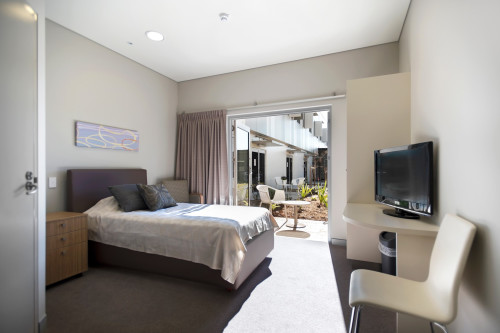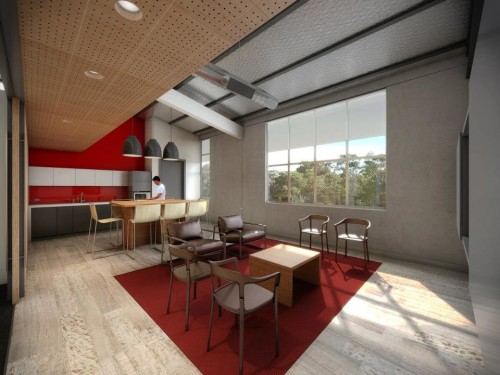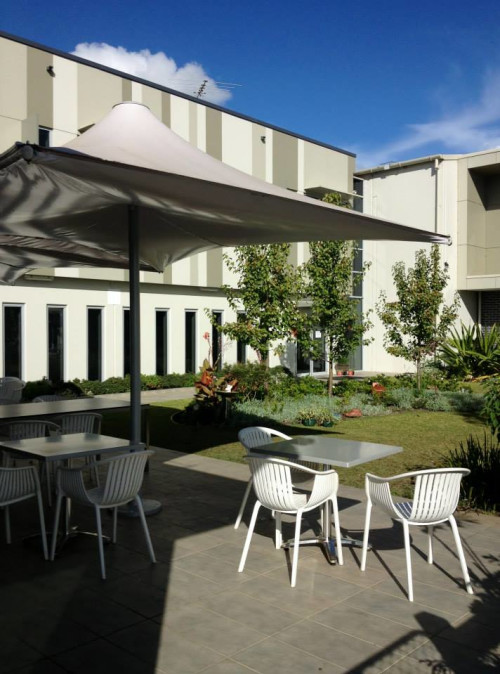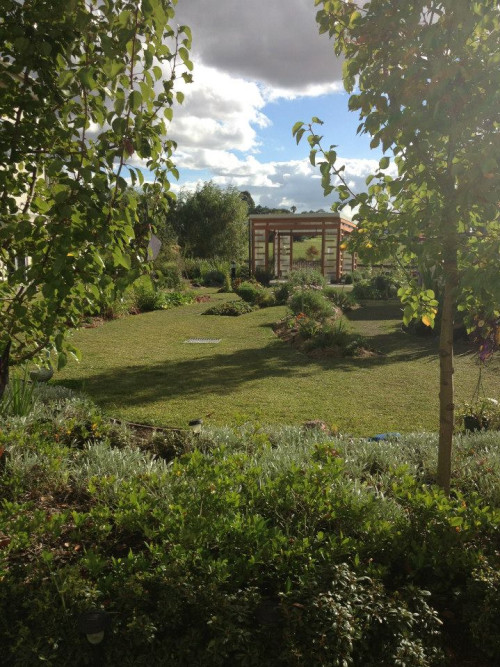






Aurora Kellyville Private Hospital
Treatment Focus
This center treats mental health conditions and co-occurring substance use. You receive collaborative, individualized treatment that addresses both issues for whole-person healing.
Primary Level of Care
Offering intensive care with 24/7 monitoring, residential treatment is typically 30 days and can cover multiple levels of care. Length can range from 14 to 90 days typically.
Claimed
Recovery.com has connected directly with this treatment provider to validate the information in their profile.
Treatment Focus
This center treats mental health conditions and co-occurring substance use. You receive collaborative, individualized treatment that addresses both issues for whole-person healing.
Primary Level of Care
Offering intensive care with 24/7 monitoring, residential treatment is typically 30 days and can cover multiple levels of care. Length can range from 14 to 90 days typically.
Provider's Policy
We have contracts with the majority of private health insurance funds. Before admission, we will check your fund details. If your private health insurance does not fully cover your stay, we will let you know your estimated out-of-pocket expenses. You will need to pay this before admission.
Aurora Kellyville Private Hospital
Aurora Kellyville Private Hospital
About Aurora Kellyville Private Hospital
Set in the northwest part of Sydney, near Kellyville Memorial Park Reserve and highway A2, Aurora Kellyville Private Hospital (formerly called "The Hills Clinic") is accredited by the Global-Mark Standards to treat adults, adolescents, and children for mental health and substance use disorders with residential, day, and outpatient treatment. Their private 85-bed facility offers free WiFi, a bedside phone, a TV with Foxtel, and snacks.
Aurora Kellyville Memorial Park admits clients using referrals from their GP or treating doctor to a psychiatrist at Aurora. Conditions they treat include ADHD, anger, anxiety, depression, bipolar disorder, OCD, personality disorders, PTSD, alcohol and drug addiction, gambling, gaming addiction, and co-occurring disorders.
Parking and Transportation
Aurora Kellyville Private Hospital is 40 kilometers from central Sydney and accessible from there using bus routes 200 and 299. The bus stop near Aurora Kellyville Private Hospital are on Memorial Avenue.
Visitors, day patients, and staff can use the parking.
Visits
Aurora welcomes and encourages visitors. They hold information sessions for caretakers each Friday from 9 to 10:30 a.m. Regular visiting hours are 4 to 7 p.m. each day.
They recommend that visitors stay at The Hills Lodge nearby if they need a hotel.
Treatment Programs
Aurora Kellyville Private Hospital uses traditional evidence-based therapies like acceptance and commitment therapy (ACT), cognitive behavior therapy (CBT), dialectical behavior therapy (DBT), and mindfulness alongside experiential therapies like art therapy and physical workouts like boxing, martial arts, tai chi, and circuit training.
Their programs include a young adults area for patients 18-25, parental training, family counseling programs, women-specific therapy, therapy that considers aging-related concerns like Alzheimer's and dementia in adults 60+, special care for veterans and widows of veterans, strength and resilience training, and transcranial magnetic stimulation (TMS). Their young adults area, The Loft, has a colorful, industrial feel that specifically avoids looking like a hospital.
TMS treatment lasts for about 4 weeks with 20-30 treatments. To track the progress of TMS, Aurora administers questionnaires to clients on their mental state at the beginning of treatment, after 2 weeks of treatment, after all 4 weeks of treatment, and 2 weeks after treatment was completed.
Their treatment for substance use disorders is abstinence-based.
Although Aurora Kellyville Private Hospital isn't a religious facility, they can incorporate religious care by clergy upon request.
Additional Locations
Aurora operates 16 clinics across Australia that offer similar treatments with specialized tracks for older and younger adults.

Center Overview
Treatment Focus
This center treats mental health conditions and co-occurring substance use. You receive collaborative, individualized treatment that addresses both issues for whole-person healing.
Insurance Accepted
Cash Pay Rates
Estimated Cash Pay Rate
Center pricing can vary based on program and length of stay. Contact the center for more information. Recovery.com strives for price transparency so you can make an informed decision.
Levels of Care






Your Care Options
Specializations
Older Adults
Addiction and mental health treatment caters to adults 55+ and the age-specific challenges that can come with recovery, wellness, and overall happiness.
Expressive Arts
Creative processes like art, writing, or dance use inner creative desires to help boost confidence, emotional growth, and initiate change.
Young Adults
Emerging adults ages 18-25 receive treatment catered to the unique challenges of early adulthood, like college, risky behaviors, and vocational struggles.
Veterans
Patients who completed active military duty receive specialized treatment focused on trauma, grief, loss, and finding a new work-life balance.
Who We Treat
Adolescents
Teens receive the treatment they need for mental health disorders and addiction, with the added support of educational and vocational services.
Young Adults
Emerging adults ages 18-25 receive treatment catered to the unique challenges of early adulthood, like college, risky behaviors, and vocational struggles.
Men and Women
Men and women attend treatment for addiction in a co-ed setting, going to therapy groups together to share experiences, struggles, and successes.
Veterans
Patients who completed active military duty receive specialized treatment focused on trauma, grief, loss, and finding a new work-life balance.
Approaches
Bio-Medical
A philosophy focusing on the biomechanics behind mental health disorders, using prescribed medications as a supplement to behavioral therapy.
Evidence-Based
A combination of scientifically rooted therapies and treatments make up evidence-based care, defined by their measured and proven results.
Family Involvement
Providers involve family in the treatment of their loved one through family therapy, visits, or both–because addiction is a family disease.
Holistic
A non-medicinal, wellness-focused approach that aims to align the mind, body, and spirit for deep and lasting healing.
Individual Treatment
Individual care meets the needs of each patient, using personalized treatment to provide them the most relevant care and greatest chance of success.
Therapies
1-on-1 Counseling
Patient and therapist meet 1-on-1 to work through difficult emotions and behavioral challenges in a personal, private setting.
Art Therapy
Visual art invites patients to examine the emotions within their work, focusing on the process of creativity and its gentle therapeutic power.
Expressive Arts
Creative processes like art, writing, or dance use inner creative desires to help boost confidence, emotional growth, and initiate change.
Acceptance and Commitment Therapy (ACT)
This cognitive behavioral therapy teaches patients to accept challenging feelings and make the appropriate changes to reach personal goals.
Conditions We Treat
Personality Disorders
Personality disorders destabilize the way a person thinks, feels, and behaves. If untreated, they can undermine relationships and lead to severe distress.
ADHD, ADD
ADHD is a common mental health condition caused by dopamine imbalance. Common symptoms include inattention, hyperactivitiy, and impulsivity.
Anger
Although anger itself isn't a disorder, it can get out of hand. If this feeling interferes with your relationships and daily functioning, treatment can help.
Anxiety
Anxiety is a common mental health condition that can include excessive worry, panic attacks, physical tension, and increased blood pressure.
Bipolar
This mental health condition is characterized by extreme mood swings between depression, mania, and remission.
Depression
Symptoms of depression may include fatigue, a sense of numbness, and loss of interest in activities. This condition can range from mild to severe.
Gambling
Excessive, repetitive gambling causes financial and interpersonal problems. This addiction can interfere with work, friendships, and familial relationships.
Gaming
Compulsive gaming is most often a problem for children and teens. The disorder can affect physical health, sleep, and the ability to focus at school.
Obsessive Compulsive Disorder (OCD)
OCD is characterized by intrusive and distressing thoughts that drive repetitive behaviors. This pattern disrupts daily life and relationships.
Substances We Treat
Alcohol
Using alcohol as a coping mechanism, or drinking excessively throughout the week, signals an alcohol use disorder.
Co-Occurring Disorders
A person with multiple mental health diagnoses, such as addiction and depression, has co-occurring disorders also called dual diagnosis.
Drug Addiction
Drug addiction is the excessive and repetitive use of substances, despite harmful consequences to a person's life, health, and relationships.
Languages
Care Designed for Your Needs
Personal Amenities
Amenities
Special Considerations
Gender-specific groups
Patients in gender-specific groups gain the opportunity to discuss challenges unique to their gender in a comfortable, safe setting conducive to healing.
Young Adults Program
Programs for young adults bring teens 18+ together to discuss age-specific challenges, vocational and educational progress, and successes in treatment.





